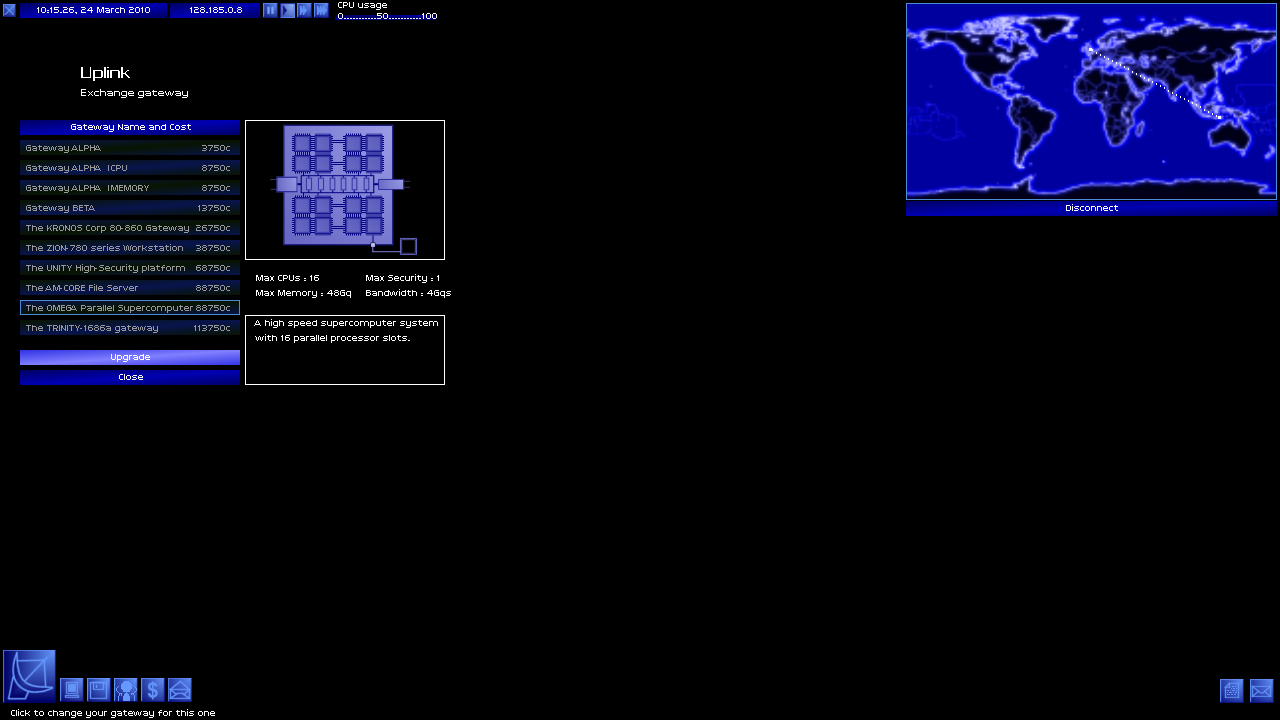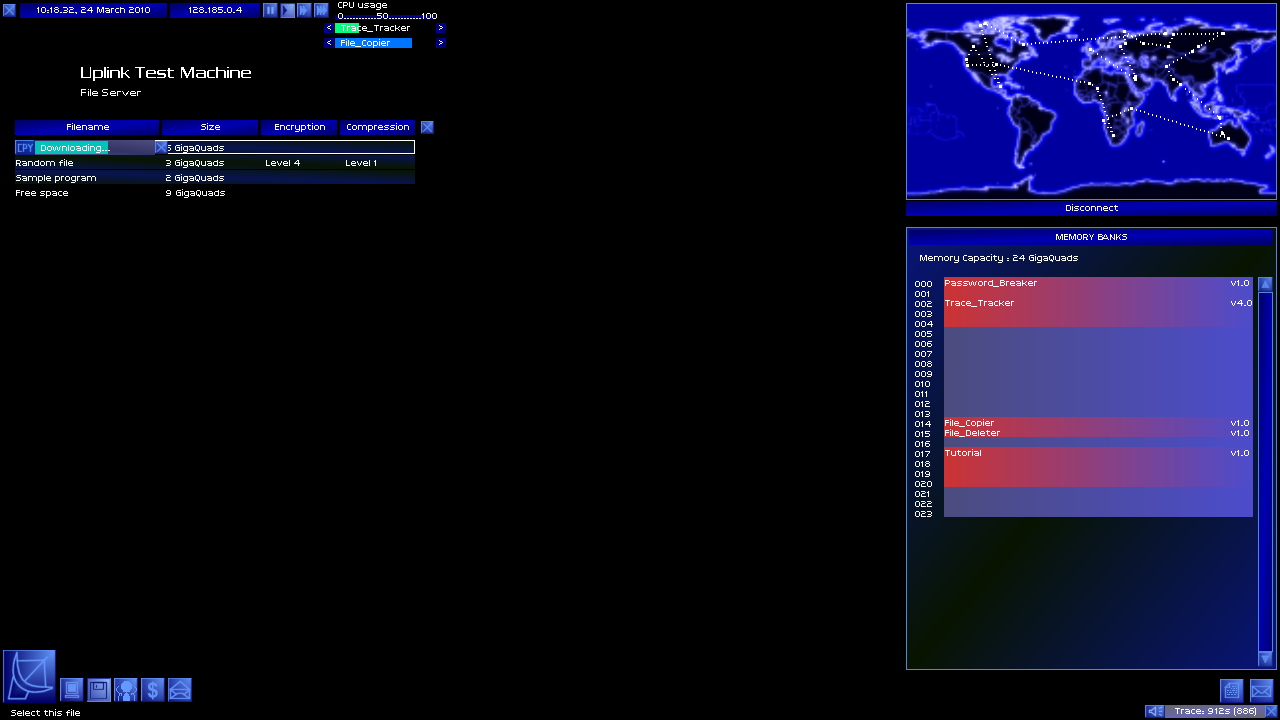The Fun Factor of Uplink
Author: Vertette Filed under: Game design Posted: October 26, 2023 20:00:00
Remember family computers? Before we had tablets, middle class families would buy overpriced computers from dodgy computer stores that the whole family got to share. As they were mostly used by children and adults who didn't have the slightest understanding of technology, it didn't take long for the family computer to down to a crawl, plagued by shady Kazaa downloads and suspicious Internet Explorer toolbars. Between a lack of money to buy a better computer, no easy way to buy digital games in Europe for the longest time and no nearby stores that sold computer games, it took until my brother moved out of the home before I really started getting into PC gaming.
My mom bought a gaming PC for my 14th birthday, and while it was incredibly overpriced for what it was, that didn't matter to me; it was mine and I could do whatever I wanted with it. As the only computer games I was familiar with were free Flash games on Newgrounds, I asked around on various communities what kind of games I could play on a slightly outdated hunk of junk like mine. I forgot who exactly was responsible, but someone recommended I try this old hacking game called Uplink, and so I found a torrent on ThePirateBay and tried it. I make the following statement with zero hyperbole - that single throwaway recommendation changed my life. Various hours later, I fell in love with it so hard that I made a Steam account just so I could buy the game and support the developers properly.
 Uplink's interface might be outdated and slightly janky, but dammit, it still looks very cool.
Uplink's interface might be outdated and slightly janky, but dammit, it still looks very cool.
If you're unfamiliar with it, here's how it works: Uplink is a hacking simulator reminiscent of old hacking movies like Sneakers and Hackers, where the portrayal is less about realism and more about flashiness. You play as a hacker who does various odd jobs like changing people's identities or destroying valuable data. At the beginning of the game, hacking is as easy as using the password breaker on a password screen and finishing up in less than five minutes to avoid getting caught, but the game quickly starts bombarding you with new concepts - deleting logs to avoid being tracked down, shutting down security systems that get in your way and travelling through local area networks. The game is never outright unfair, as most information you need to get through the game can be found in the in-game help section, but certain concepts require a bit of trial and error before you truly get how they work and that can result in you getting caught by the authorities, which results in an instant game over. Thankfully, starting over and getting back to where you were before isn't as daunting as it seems due to Uplink's fairly open structure. While the game is a bit on the short side, there's enough depth to its mechanics to feel satisfying to master, and the realization that a game that gave you so much trouble at first has turned into a total cakewalk can't be matched.
Before Uplink, I only really played games like Mario, Grand Theft Auto and Alien Hominid; games that might or might not feature mature content, but were decidedly arcadey in nature. They didn't care that much about immersion or emotional engagement. Uplink was a different beast: it pulled me right in with its beautiful ambient soundtrack, retrofuturistic visuals and gameplay that was unlike anything I had ever experienced. Sure, it might not have any fancy 3D models and complex shaders, but I still felt absorbed in a way no other game had done before. Its gameplay was highly addictive and its presentation deceptively brilliant, with a story that would've been deemed too ambitious for an AAA game even at the time. I became an obsessed man, looking up everything that I could find about the game and its developers, buying their newer games Darwinia and DEFCON and reading the Uplink design documents on the Bonus Disk religiously. Before Uplink, I never gave game design much consideration. I never thought about all the possibilities games have to tell unique stories or how certain game mechanics can make you feel certain emotions. So what is it about the gameplay that makes it so engaging, so immersive and so much fun? Well, the answer might not be what you'd expect: even though there's plenty to praise about Uplink's design, it manages to be so engaging and immersive because it isn't actually that much fun.
 Fun fact: the Trace Tracker's beeps were a last minute addition. There is a world map upgrade that shows you exactly how far the administrator's trace is, but nobody buys it because it doesn't beep.
Fun fact: the Trace Tracker's beeps were a last minute addition. There is a world map upgrade that shows you exactly how far the administrator's trace is, but nobody buys it because it doesn't beep.
That might make it sound like yet another pretentious indie game that sacrificies good gameplay in service of a Very Important Message™, but that's not actually the case. The anticipation of planning your next attack, the tension as the trace tracker's beeps become quicker and quicker as the system administrator starts closing in on you, the euphoria of a successful job that gets quickly swallowed up by the creeping paranoia of whether you properly correctly cleaned up after yourself or not - Uplink is a hurricane of emotions, but a lot of the emotions it invokes aren't exactly what you'd call positive ones. In that sense, while the game can be fun, it can also feel very tense, obtuse and frustrating, and that's important. Without that, the experience would not nearly be as effective at making you feel like a real hacker as it is, even if the moment-to-moment gameplay pretty much boils down to a script kiddie simulator. The way it goes about it elevates it to something much grander, something truly innovative and memorable, and in that sense "fun" is simply too limiting a term to describe Uplink's design.
That might sound silly to a lot of players, because "if the game's not fun, why bother", right? But there is an actual precedence for this claim, for example horror games. Most people play horror games not to feel amused but to feel spooked, and those two emotions are almost directly on the opposite end of the emotion wheel. If a horror game is fun to you, then it's doing a very bad job. Another good example is Pathologic, a game that deliberately goes out of its way to be an unpleasant experience to sell the setting of a plague-ridden town in a very effective and memorable way. Even though I find it hard to recommend it, I also find it hard to dismiss it as not being worth your time. And I don't want to ruin people's laughs from back when Neill Druckmann infamously claimed they didn't use the word "fun" during development of The Last of Us 2, but that is a valid way to design your game. The way he phrased it made it come across as more pretentious than he meant it to, but the gameplay of TLOU2 invokes a lot of the same emotions that Uplink does: tension, paranoia, and euphoria. If games really are an art form, then limiting the design to what's fun is ignoring so many other emotional reactions your game can inspire in others.
That doesn't mean that designing a fun game isn't valuable, but it does mean that it's worth exploring emotions through your game that aren't directly adjacent to fun. With all the opportunities the medium of video games has over others, it would be a waste not to.